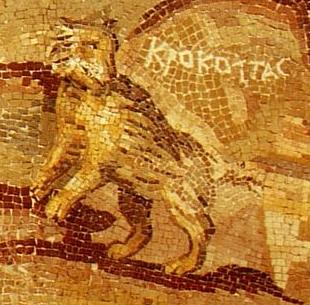Paradoxographus Vaticanus, 25-28, 45
25 “Among the Iberians there is a tribe [and] and in a certain festival they honor women with gifts, however so many demonstrate at that time that they can weave the most numerous and beautiful cloaks.”
Παρὰ τοῖς ῎Ιβηρσιν ἔθνος ἐστὶ ἐν ἑορτῇ τινι τὰς γυναῖκας τιμῶν δώροις, ὅσαι ἂν πλεῖστα καὶ κάλλιστα ἱμάτια ὑφήνασαι τότε ἐπιδείξωσιν.
26 “Among the Krobuzoi it is the custom to mourn when an infant is born and consider the one who dies lucky”
Παρὰ Κροβύζοις ἔθος ἐστὶ τὸ μὲν γεννώμενον βρέφος θρηνεῖν, τὸν δὲ θανόντα εὐδαιμονίζειν.
27 “Among the Nasamoi in Libya it is the custom that on the first day a woman is married that she has sex with everyone who is present and then take gifts from them. After that, she has sex only with the one who marries her.”
Παρὰ Νασαμῶσι τοῖς ἐν Λιβύῃ νόμος ἐστὶ τὴν γαμουμένην τῇ πρώτῃ ἡμέρᾳ συγγίνεσθαι πᾶσι τοῖς παροῦσι καὶ παρ’ αὐτῶν δῶρα λαμβάνειν καὶ μετὰ τοῦτο τῷ γήμαντι μόνῳ μίγνυσθαι.
28 “The women of the Sauromatoi do not get married unless they kill an enemy man.”
Αἱ τῶν Σαυροματῶν γυναῖκες οὐ πρότερον γαμοῦνται, ἂν μὴ ἄνδρα κτάνωσι πολέμιον.
45 “The Liburnians have shared wives and they raise their children in common for five years. When they make it to the eighth year, they compare the children for their similarity to the men and they distribute to each one who is similar. And that one keeps him as a son.”
Λιβύρνιοι κοινὰς τὰς γυναῖκας ἔχουσι καὶ τὰ τέκνα ἐν κοινῷ τρέφουσι μέχρι ἐτῶν πέντε· εἶτα τῷ ἔκτῳ συνενέγκαντες ἅπαντα τὰ παιδία τὰς ὁμοιότητας πρὸς τοὺς ἄνδρας εἰκάζουσι, καὶ ἑκάστῳ τὸν ὅμοιον ἀποδιδόασι, καὶ λοιπὸν ἐκεῖνος ὡς υἱὸν ἔχει.
51 “The Assyrians sell their daughters in the marketplace to whoever wants to settle down with them. First the most well-born and most beautiful and then the rest in order. Whenever they get to the least attractive, they announce how much someone is willing to take to live with them and they add this consolation price from the fee charged for the desirable girls to these [last ones].”
᾿Ασσύριοι τὰς παρθένους ἐν ἀγορᾷ πωλοῦσι τοῖς θέλουσι συνοικεῖν, πρῶτον μὲν τὰς εὐγενεστάτας καὶ καλλίστας, εἶτα τὰς λοιπὰς ἐφεξῆς· ὅταν δὲ ἔλθωσι ἐπὶ τὰς φαυλοτάτας, κηρύττουσι πόσον τις θέλει προσλαβὼν ταύταις συνοικεῖν, καὶ τὸ συναχθὲν ἐκ τῆς τῶν εὐπρεπῶν τιμῆς ταύταις προστίθενται [ταῖς παρθένοις].









